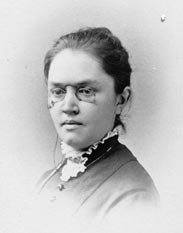Our Crown Of Praise
Katharine Lee Bates 1859 (Falmouth) – 1929 (Wellesley)
A PRAISE beyond all other praise of ours
This nation holds in jealous trust for him
Who may approve himself, even in these dim,
Swift days of destiny, the soul that towers
Above the turmoil of contending powers,
A beacon firm, while seas of fury brim
The world's long-labored fields and vineyards trim,
Remembering forests and unconscious flowers.
Our nation longs for such a living light,
Kindred to stars and their eternal dreams,
A steadfast glow whatever breakers roll,
Cleaving confusions of the stormy night
With gracious lusters and revealing gleams,
—Longs for the shining of a Lincoln soul.
Font size:
Submitted on May 13, 2011
Modified on March 05, 2023
- 30 sec read
- 57 Views
Quick analysis:
| Scheme | ABBAABBACDECDE |
|---|---|
| Closest metre | Iambic pentameter |
| Characters | 596 |
| Words | 101 |
| Stanzas | 1 |
| Stanza Lengths | 14 |
Translation
Find a translation for this poem in other languages:
Select another language:
- - Select -
- 简体中文 (Chinese - Simplified)
- 繁體中文 (Chinese - Traditional)
- Español (Spanish)
- Esperanto (Esperanto)
- 日本語 (Japanese)
- Português (Portuguese)
- Deutsch (German)
- العربية (Arabic)
- Français (French)
- Русский (Russian)
- ಕನ್ನಡ (Kannada)
- 한국어 (Korean)
- עברית (Hebrew)
- Gaeilge (Irish)
- Українська (Ukrainian)
- اردو (Urdu)
- Magyar (Hungarian)
- मानक हिन्दी (Hindi)
- Indonesia (Indonesian)
- Italiano (Italian)
- தமிழ் (Tamil)
- Türkçe (Turkish)
- తెలుగు (Telugu)
- ภาษาไทย (Thai)
- Tiếng Việt (Vietnamese)
- Čeština (Czech)
- Polski (Polish)
- Bahasa Indonesia (Indonesian)
- Românește (Romanian)
- Nederlands (Dutch)
- Ελληνικά (Greek)
- Latinum (Latin)
- Svenska (Swedish)
- Dansk (Danish)
- Suomi (Finnish)
- فارسی (Persian)
- ייִדיש (Yiddish)
- հայերեն (Armenian)
- Norsk (Norwegian)
- English (English)
Citation
Use the citation below to add this poem to your bibliography:
Style:MLAChicagoAPA
"Our Crown Of Praise" Poetry.com. STANDS4 LLC, 2024. Web. 20 Apr. 2024. <https://www.poetry.com/poem/24883/our-crown-of-praise>.



Discuss the poem Our Crown Of Praise with the community...
Report Comment
We're doing our best to make sure our content is useful, accurate and safe.
If by any chance you spot an inappropriate comment while navigating through our website please use this form to let us know, and we'll take care of it shortly.
Attachment
You need to be logged in to favorite.
Log In